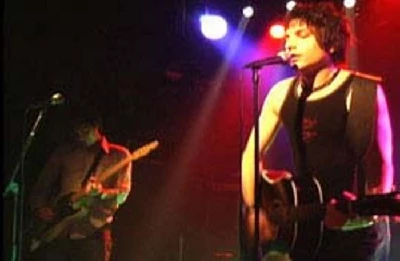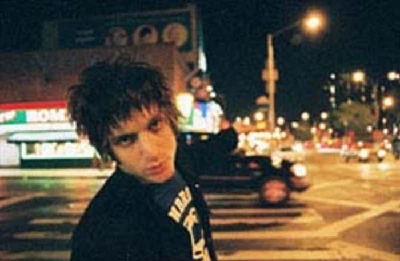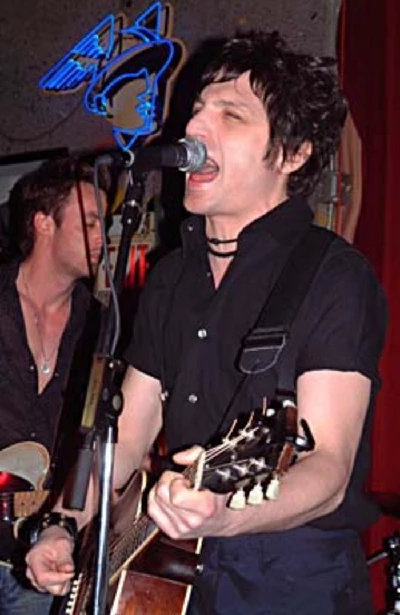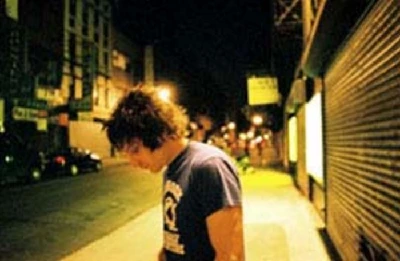published: 14 /
6 /
2004

Much acclaimed singer-songwriter Jesse Malin recently returned with his second album, 'The Heat'. He speaks to Emma Haigh about how he has avoided the pitfalls of making the same album twice
Article
Progress is something Jesse Malin alludes to frequently. Listening to him speak you get a sense of the urgency and determination to move forward, to constantly attack and question boundaries, that propels how he approaches music. It’s an entire philosophy that goes beyond wanting to make a statement, rather an active undertaking to make that statement understood. With his 2002 solo debut, 'The Fine Art of Self Destruction', the former frontman of punk outfit D Generation sought to bare the gritty underbelly of his native New York, to force people to confront realities of being they would rather ignore. While his new album 'The Heat' has that same driving force, its result is by no means static.
"The second record should always be different," he says. “Making progress while remaining true to the spirit of what you do…I didn't want to make the same record again and I wanted to create my own niche and show people I'm not one of a generic bunch of singer/songwriters.”
His 2002 debut, ,'The Fine Art Of Self Destruction', was written and perfected over the course of three years; produced by long-time friend and collaborator Ryan Adams, it was recorded in a mere six days. With Adams name attached, it was bound to get noticed, and yet the accolades and critical success it earned proved Malin as a talent beyond mere association.
Almost as a demonstration of his determination to carve out his own pocket of the industry, 'The Heat' was a true solo effort produced by Malin alone at Stratosphere studio (owned by James Iha and Fountains of Wayne’s Adam Schlesinger) over an 11-odd month space whenever there was a gap could be found in his schedule between touring and heading back to New York. Writing songs on the road whenever he could find the time or the privacy. “I’d write however many songs, twenty five, thirty, go into the studio and record six, then go back on the road…We had more time, but less in a way. It was an interesting way to make a record.”
Like his predecessors, such as Bruce Springsteen and Bob Dylan, the magic of Malin’s music remains in his ability to introduce a moment of ordinary life, captured in it’s perfect essence, and for him art exists as a social medium. To expose the sodden black underbelly of society, to extract a perfect single moment of joy and loss, to push those questions we’d rather not have to answer, didn’t know where there, under a sharp light and force us to ponder. He lists off the likes of Ssorcese and the exacting pain as caught in 'Taxi Driver', and the brutal truth of Tennessee Williams' 'A Streetcar Named Desire' as two examples of the power an artist weilds to reflect the tragedy of apathy and, more importantly, of how the most masterful artists will put you “right there in a time and place so you can smell it." Above all the artistry found at the core each of his songs is the desire to produce an effect within the listener and, he hopes, to incite, to activate. “In the end, you want to be taken somewhere. It needs to take you out of your spot and do something – if not, it’s flat.”
True to his word, 'The Heat' has much of the potency and defiance against the almost inherent stagnation of middling society as his debut, yet there is an underlying and distinct evolution that precipitates subtly through and into your subconscious. The raw edge has become rougher, the vignettes more affecting. With the staggering weight of lyrical countenance, the sonic altitude has soared. Heavier drums, more electric guitar, a hint of **. And all accomplished while maintaining the intimacy and longing that attracted fans to him in the first place.
The range is greater and he swims easily from the hauntingly dark vignettes about prostitution in 'Arrested', incest in 'Basement Home' and urban decay 'Silver Manhattan' to pure and bracing rawk in 'Swinging Man' to an inquest into the worrying oppression that has seeped over the Land of the Free and the Home of Brave since 9/11 in 'New World Orde'.
“Lyrically I wanted to deal with things. Writing from the road, being out of America a lot, I was able to be objective” to what he sees as the apathy of American youth. With this in mind the desire to move forward, to better society, become clear. Until we expose the rank and grim realities of our society, the ones we so keenly turn away from, apathy itself is our oppression.
Essentially what it all boils down to is that the audience engages with him.
“Listen to it in your own environment,” he urges. “Whatever makes you comfortable. Listen to the lyrics, find some connection to it.” And remember what he says.
Picture Gallery:-


